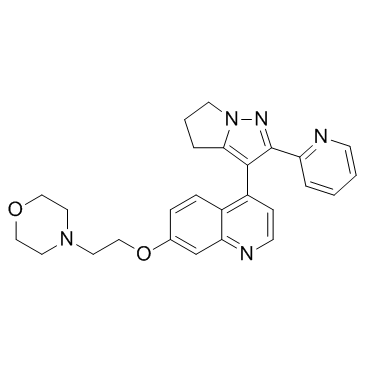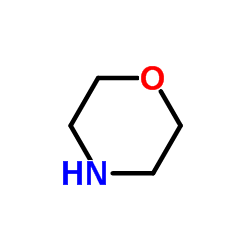| Description |
LY2109761 is an orally active, selective TGF-β receptor type I/II inhibitor with Kis of 38 nM and 300 nM, respectively.
|
| Related Catalog |
|
| Target |
Ki: 38 nM (TβRI), 300 nM (TβRII)
|
| In Vitro |
LY2109761 significantly inhibits the growth of L3.6pl/GLT soft agar colonies in a dose-dependent manner, and results in appr 33% inhibition at 2 μM and 73% inhibition at 20 μM. Targeting TβRI/II kinase activity with LY2109761 (5 μM) almost completely suppresses both the basal and TGF-β1-stimulated migration of L3.6pl/GLT cells[1]. LY2109761 induces a dose-dependent reduction in phosphorylation of Smad-2. HLE endogenous phosphorylation of Smad-2 is inhibited by LY2109761. LY2109761 blocks migration on different ECM proteins and invasion of both HLE and HLF through a 3-dimensional structure. LY2109761 increases E-cadherin mRNA expression after 24 hours and protein levels after 48 hours[2]. LY2109761 pretreatment reduces clonogenic survival in cell cultures of U87MG and T98 following radiation, resulting in an increase in the radiosensitivity with a DEF0.1 of 1.30 and 1.37, respectively[3].
|
| In Vivo |
LY2109761 (50 mg/kg, p.o.) greatly reduces the tumor volume and increases the median survival duration of the mice to 45.0 days. The mice treated with LY2109761 develop significantly fewer metastatic lesions and, in some of them, no metastatic lesion, as indicated by the GFP signal, can be identified in the abdomen[1]. LY2109761 enhances radiation-induced tumor growth delay in a U87MG subcutaneous xenograft tumor model in BALB/c nude mice. LY2109761 increases survival in an orthotopical CSLC glioblastoma model and enhanced antitumor activity of radiation[2].
|
| Cell Assay |
L3.6pl/GLT cells are washed twice with cold PBS and lysed at 4°C into RIPA buffer (50 mM Tris HCl [pH 8], 150 mM NaCl, 1% NP-40, 0.5% sodium deoxycolate, and 0.1% SDS). Tumor and liver specimens are homogenized into RIPA buffer with an electric homogenizer and then maintained in constant agitation for two hours at 4°C. The lysates are cleared by centrifugation. Each lysate (20 µg of protein) is separated by 8% SDS-PAGE and probed with polyclonal rabbit antibodies against total ERK1/2, TβRI, and TβRII or with monoclonal mouse antibodies against phosphorylated Smad2, total Smad2, phosphorylated ERK1/2, and phosphorylated and total JNK. Immunoreactive proteins are visualized with Lumi-Light Western blotting substrate according to the manufacturer's instructions. phosphorylated Smad2/Smad2 band density ratios are calculated using the ImageQuant software.
|
| Animal Admin |
Fifty mice are randomLy allocated into five groups (n=5 mice per group) to receive p.o. vehicle for 50 μL of LY2109761 or 50 mg/kg LY2109761 twice a day p.o. On day 0, mice are anesthetized with 1.5% isofluorane-air mixture, a small left abdominal flank incision is created, and the spleen is carefully exteriorized. L3.6pl/GLT or C5LM2/GLT cells (1.0×105 cells/50 μL of HBSS), cultured in the presence of LY2109761 (5 μM) or DMSO from day −5 to day 0, are inoculated into the spleen with a 30-gauge needle. A visible paling of the spleen is the criterion for successful inoculation. After 10 min, the spleen is removed using a high-temperature cautery to avoid the possibility that the ectopic growth of pancreatic tumor cells in the spleen could be a confounding source of hematogenous liver metastatic cells. The abdominal wall is closed in one layer with wound clips. Treatment with 50 mg/kg LY2109761 twice a day p.o. (days 1-5 of each week after inoculation) is continued for one group of untreated mice inoculated with untreated cells.
|
| References |
[1]. Melisi D, et al. LY2109761, a novel transforming growth factor beta receptor type I and type II dual inhibitor, as a therapeutic approach to suppressing pancreatic cancer metastasis. Mol Cancer Ther, 2008, 7(4), 829-840. [2]. Fransvea E, et al. Blocking transforming growth factor-beta up-regulates E-cadherin and reduces migration and invasion of hepatocellular carcinoma cells. Hepatology, 2008, 47(5), 1557-1566. [3]. Zhang M, et al. Blockade of TGF-β signaling by the TGFβR-I kinase inhibitor LY2109761 enhances radiation response and prolongs survival in glioblastoma. Cancer Res, 2011, 71(23), 7155-7167.
|



![methanesulfonic acid 2-[4-(2-pyridin-2-yl-5,6-dihydro-4H-pyrrolo[1,2-b]pyrazol-3-yl)-quinolin-7-yloxy]-ethyl ester structure](https://image.chemsrc.com/caspic/445/700874-75-5.png)